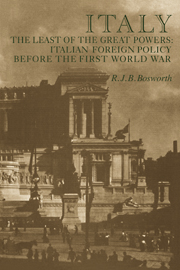Book contents
- Frontmatter
- Contents
- Dedication
- Preface
- List of maps
- 1 Society and politics in Liberal Italy
- 2 New political pressure groups and foreign policy
- 3 The making of a Foreign Minister: Antonino Di San Giuliano
- 4 The Consulta: the bureaucrats of foreign policy
- 5 How Italy went to Libya
- 6 How Italy stayed in Libya
- 7 The politics of alliance: Italy in the Triple Alliance, 1912–1914
- 8 The politics of friendship: Italy, the Triple Entente, and the search for a new Mediterranean agreement, 1911–1914
- 9 ‘Un cliente maleducato’: Italy in the Dodecanese and Ethiopia, 1912–1914
- 10 Preparing to digest some spoils: Italian policy towards Turkey, 1912–1914
- 11 San Giuliano's epilogue. The realities of European war 28 June to 16 October 1914
- Conclusion
- Appendix I The Ten Commandments for Italians abroad
- Appendix II Pro-memoria on our politico-military situation, by A. Pollio
- Appendix III San Giuliano's poem about his funeral ceremony
- Abbreviations used in the notes and bibliography
- Select bibliography
- Notes
- Index
11 - San Giuliano's epilogue. The realities of European war 28 June to 16 October 1914
Published online by Cambridge University Press: 16 November 2009
- Frontmatter
- Contents
- Dedication
- Preface
- List of maps
- 1 Society and politics in Liberal Italy
- 2 New political pressure groups and foreign policy
- 3 The making of a Foreign Minister: Antonino Di San Giuliano
- 4 The Consulta: the bureaucrats of foreign policy
- 5 How Italy went to Libya
- 6 How Italy stayed in Libya
- 7 The politics of alliance: Italy in the Triple Alliance, 1912–1914
- 8 The politics of friendship: Italy, the Triple Entente, and the search for a new Mediterranean agreement, 1911–1914
- 9 ‘Un cliente maleducato’: Italy in the Dodecanese and Ethiopia, 1912–1914
- 10 Preparing to digest some spoils: Italian policy towards Turkey, 1912–1914
- 11 San Giuliano's epilogue. The realities of European war 28 June to 16 October 1914
- Conclusion
- Appendix I The Ten Commandments for Italians abroad
- Appendix II Pro-memoria on our politico-military situation, by A. Pollio
- Appendix III San Giuliano's poem about his funeral ceremony
- Abbreviations used in the notes and bibliography
- Select bibliography
- Notes
- Index
Summary
It may seem curious to call the July crisis and the first months of World War I an epilogue. Yet, for the foreign policy of Antonino Di San Giuliano, and for the traditions of diplomacy in Liberal Italy, a real European crisis and a real European war were disasters, talked about before, but, in reality, unlooked for. So much of Italian policy in the last years had been a conjuring trick, the sort of sleight of hand which was encouraged by Italy's role as the least of the Great Powers; but, from August 1914, conjuring tricks were unlikely any longer to be good enough. All the other Great Powers had gone to war. The simple corollary was that Italy, as a Great Power, must also, sooner or later, enter the war. For this task perhaps she would have to rely on the King and his generals, given the ultimate realities enunciated by Victor Emmanuel III some years before:
I am more than ever convinced of the utter worthlessness of treaties or any agreements written on paper. They are worth the value of the paper. The only real strength lies in bayonets and cannon.
Yet, a reliance on bayonets and cannon was not a comfortable prospect in Liberal Italy, for bayonets and cannon had seldom brought military triumph, and an Army, wasted by the conflict in Libya and the continued need for ‘pacification’ there, was hard to regard as likely to be an immaculate agent of an ever victorious foreign policy.
It was also regrettably true that the Army was needed at home.
- Type
- Chapter
- Information
- Italy the Least of the Great PowersItalian Foreign Policy Before the First World War, pp. 377 - 417Publisher: Cambridge University PressPrint publication year: 1979
- 1
- Cited by

